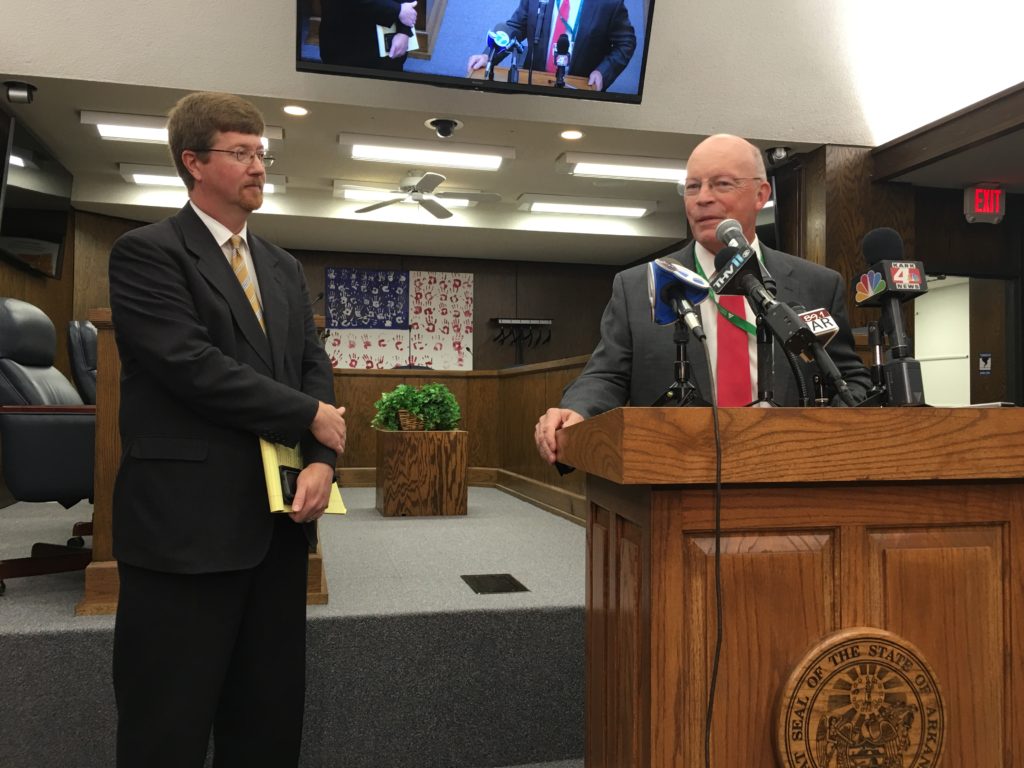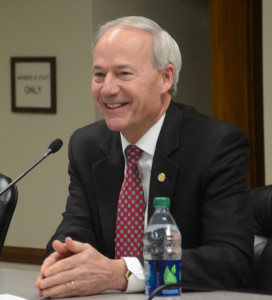
By Steve Brawner
© 2016 by Steve Brawner Communications, Inc.
Reporters have biases, and I’ll admit to mine: Two of the government officials I like the most are Johnny Key, the state’s education commissioner, and Baker Kurrus, the soon-to-be-former Little Rock School District superintendent.
The two have been linked together for the past year. Key is a former state senator, not an educator, which a lot of unhappy people noted when Gov. Asa Hutchinson picked him for the state’s leading public schools post. Because the State Board of Education had taken over the Little Rock School District, Key became its de facto school board when he became commissioner, and he appointed Kurrus as superintendent.
Kurrus is also not an educator – which, again, a lot of unhappy people noted when Key appointed him – though he had served for a while on the Little Rock School Board. He’s an attorney and a businessman, as well as a competent, passionate, driven individual. He went to work organizing things, talking to people, and showing that he cared. He brought hope, and people warmed up to him.
Earlier this month, Key decided not to renew Kurrus’ one-year contract, which clearly disappointed and surprised Kurrus. His replacement is Mike Poore, who currently is superintendent of the Bentonville School District and led a large, urban district out of academic trouble when he was working in Colorado.
In an interview in his office Tuesday, Key said the Kurrus hiring was always supposed to be temporary, though “temporary” was never defined. He said that while the state took over the district because of academics, there were fiscal and foundational problems that needed to be addressed first, and Kurrus was uniquely able to do that because of his organizational skills.
Key’s decision surprised and angered a lot of people and put the governor in a tough spot with some of the Little Rock legislators.
I also was surprised. I watched Key as a well-liked legislator carefully, even unnecessarily, build a coalition to pass a school choice plan.
How could such an accomplished bridge builder act so arbitrarily? In a press conference with Kurrus last Tuesday and during the interview the following Tuesday, Key explained that Kurrus had accomplished his mission of righting the ship, but now it’s time to focus on the academic distress that caused the state takeover in the first place. Poore has experience that Kurrus lacks. In between on Friday afternoon, Key issued a statement admitting he had erred in how he went about making the change.
In our interview, Key explained this is the time of year when superintendents are replaced. Little Rock has five years to get out of academic distress, and one of those years is gone. He didn’t want to wait another year and believes Poore is better suited to move Little Rock out of, and well past, academic distress.
“The broader issue was, Baker’s got us where we need to be right now. Who can come in and take us to that next level?” he said.
Some people aren’t buying it. They’re saying this is about the two men disagreeing about charter schools, which, in some cases, involve a private entity operating a school funded with taxpayer dollars. In Little Rock, two of these in particular are popular: eStem and the LISA Academy. Kurrus has publicly worried those schools will take students from the Little Rock School District, further disadvantaging it. Key tends to believe competition makes schools better, as do certain school reform types such as the Walton Family Foundation.
Some are saying that Kurrus publicly questioned charter schools, but Key and his big business overlords like charter schools, so Kurrus was shown the door. Everything has to be a conspiracy these days.
Key told me in his office that the two did disagree about charter schools, but it was not a “determining factor” and that the charter disagreement was a “minimal” consideration. When I pressed him on what “minimal” meant, he held his thumb and pointer finger an inch apart and repeated that it wasn’t the issue. The issue was that Poore had the skill set he wanted.
Remember, I’m biased towards Key and Kurrus. It’s possible that Key was spinning me, of course. But if he were, I would think he would have said “none” instead of “minimal.”
Key said it was time for an academic type to fix a school district in academic distress. That part is easy to understand, even if suddenly replacing a man who was succeeding isn’t.


